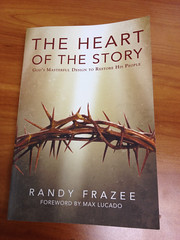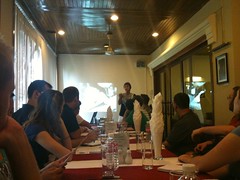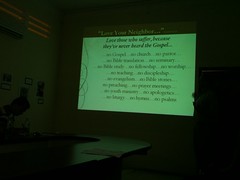 There have been a number of Q Talks that stood out to me and this is among them. Part of it is because we need to talk more about the abortion issue but we need to do it with more grace and compassion. Given the sensitivity of the conversation, I’ve been waiting to re-listen to the talk and it has recently become available on Q Premiere. (You can subscribe here and please know that I promoting this completely out of my own volition. I am receiving no compensation or courtesy membership. My gain is participating and the sharing of the conversation).
There have been a number of Q Talks that stood out to me and this is among them. Part of it is because we need to talk more about the abortion issue but we need to do it with more grace and compassion. Given the sensitivity of the conversation, I’ve been waiting to re-listen to the talk and it has recently become available on Q Premiere. (You can subscribe here and please know that I promoting this completely out of my own volition. I am receiving no compensation or courtesy membership. My gain is participating and the sharing of the conversation).
This panel was moderated by Rebekah Lyons. The panelists include Jenell Paris, professor of anthropology at Messiah College in Grantham, PA; Sarah Brown, CEO of The National Campaign to Prevent Teen and Unplanned Pregnancy; Angie Weszely, President of Caris, a faith-based nonprofit providing support to all women facing unplanned pregnancies; and Johnny Carr, National Director of Church Partnerships for Bethany Christian Services, America’s largest adoption agency (panel description taken from the Q site)
So the first thing that seems obvious to ask is why are some of us still not ready to talk about abortion? It needs to be said that there is a sizable evangelical demographic that is still not ready to talk about it. Of course the abortion issue has never gone away but many cannot bear the thought of discussing it again which begs the question why.
For some of us, we were brought up in “culture war” settings where abortion was the classic example of evil and those that performed them or had one were cast as the worst type of human. Some of us are still drained and disillusioned from this part of the culture war and cannot bare to bring it back up again. I understand that some people will not find that acceptable but among the lessons that I take is the “culture war” does too much damage to too many people (including our “own”).
Further, even if we/they have never actually stood in protest at an abortion clinic, having a pro-life conviction cast a great deal of tension with those that were pro-choice. And many of those that have pro-choice stances hate abortion as much as we do, but they are convinced that the choice must be honored. For me, these include some dear people whom I regard as good friends. We may disagree but it makes less sense to me/us to break fellowship.
So here’s the interesting part. It turns out that despite a sizable demographic not talking about it, teen pregnancy has gone down, the number of teen abortions has gone down and there is always a story of an abortion clinic that has had to close its doors so why bring it up now? This has also resulted in the number of adoptions having gone up. In light of that, it’s tempting to think that if we wait a few more years in complete silence, the whole issue might all go away.
That’s the interesting part. The crazy part is the beginning of the bestseller Freakonomics where there is a connection between the reduction in crime in major cities like New York and the increase in abortions among particular demographics that are believed to would have contributed to the crime rate. It’s horrifying and offensive while being statistically staggering.
Sitting in silence is not going to do any long term good and statistics implying the social benefits of infanticide is not going to help either. It’s time for Christians to talk graciously about reducing abortion.
The first thing that some of my conservative brothers and sisters will notice about that last sentence is why I chose to use “reducing abortion” language than say, overturning Roe v. Wade. My answer is threefold: First using overturning Roe v. Wade rhetoric is a hyper-politically charged conversation, therefore polarizing, therefore not helpful for legitimate conversation.
Two, the reducing language not only avoids villiianzing others but it suggests that people sincerely want to help others.
Three, just about everyone publicly agrees that we need to reduce the number of abortions – therefore we have common ground.
During the panel discussion, Sarah Brown pointed out that of the 1.2 million abortions per year, 85% are by unmarried women and fewer than 20% are by teens. Majority of women who have unplanned/unintended pregnancies and having abortions are unmarried twenty-somethings. Among them are women with stable careers.
Three-fourths of evangelicals have admitted they have had pre-marital sex so as others have pointed out, the message of abstinence has not exactly been well-received. Whether certain people care to admit or not, among the key reasons the teen pregnancy rate has gone down is because of the increased use of contraceptions. Which brought up the need for discussing the use of contraception in churches.
I’ll admit, I don’t really hear myself saying from the pulpit, “Those women who do not wish to get pregnant, you are to be abstinent and if you can’t, use contraception …” For one, when I preach, I don’t preach like that (not intended to sound condescending to those that do). Further, I am not a weekly preacher so most of my ministry happens away from the pulpit. But I am not uncomfortable talking about the use of contraceptives. Truth is, I have in specific instances for years because frankly, you don’t have to wait for the Pew Forum to release the research saying that 3/4s of evangelicals are having pre-marital sex to figure out what’s going on.
And while I do I try to avoid sending conflicting messages, these messages are contextual. If you really listen to what some people are saying whether in your office or your small group or wherever people are choosing to be vulnerable, you might understand what I’m saying here. My point for saying all this here is – let’s be faithful with these opportunities to help reduce the number of abortions.
Which brought up a major theme in the panel discussion. Those in the church need to better express “grace theology” when it comes to women and unplanned pregnancies (and to the men who don’t cut and run). I will say this doesn’t feel as big of an issue in the churches that I’ve been a part of but sadly, I have heard too many horror stories of women feeling shamed in some way. The flip side though is I don’t know how many people never came to the churches I was a part of because of what attitudes and judgements they thought may have been lurking inside. We need to make sure that the church is a place of many things including belonging, grace, and unconditional love.
This is where the graciousness conversation comes in. In my scope I do see a number of churches (and Christians in general) getting better at encouraging each other to adopt, foster and support children. Some are also getting better at reaching out to single moms and families whose financial circumstances make it almost impossible to survive. Some pulpits have eliminated culture war language and a spirit of hospitality is emerging but not only is there so much work to be done, very few actually regard the Church as a place of welcome.
For serious Christians, that needs to change. Much of the work to be done begins in conversation as it is one of the elements that changes culture. We need to invite those that have stopped talking about this issue back into the conversation and foster a gracious discussion on such a crucial issue. Thoughts, concerns, push-backs, feel free to comment. Also, if you share some similar feelings here, please share – the more people that talk about worthy things, the better.
Here are a couple other posts on QDC – thanks for reading.
 It could be since the release of Real Marriage, but these days, there is a steady barrage of jokes, posts, and youtube clips about Mark Driscoll. Lately, I probably click on one out of ten tweets/posts which got me wondering a little how I/we got here. To be up front, I am among the offenders. I’ve been guilty of retweeting, I’ve been guilty of hating on him, and I’ve made my jokes – and some of them have been down-right funny. I’ve repented.
It could be since the release of Real Marriage, but these days, there is a steady barrage of jokes, posts, and youtube clips about Mark Driscoll. Lately, I probably click on one out of ten tweets/posts which got me wondering a little how I/we got here. To be up front, I am among the offenders. I’ve been guilty of retweeting, I’ve been guilty of hating on him, and I’ve made my jokes – and some of them have been down-right funny. I’ve repented. Back in the fall, one of our LIFE Communities (our version of small, mid-size group ministry) organized a presentation from the organization
Back in the fall, one of our LIFE Communities (our version of small, mid-size group ministry) organized a presentation from the organization  Note: I have received this book from the Book Sneeze Blogger Program of Thomas Nelson Publishers. I am not paid for my reviews nor am I required to give a positive review (only an honest one).
Note: I have received this book from the Book Sneeze Blogger Program of Thomas Nelson Publishers. I am not paid for my reviews nor am I required to give a positive review (only an honest one). From the Publisher:
From the Publisher: The first one we went to was
The first one we went to was  to connect some of their initiatives with our Second Mile Ministry, maybe now is the time. To the approval of some,they are more blatantly a Christian mission organization and while there was a bit of discussion on how that limits them, it was also great to see an outspoken ministry (Hagar’s website describes themselves as Christian too – just fyi). Those who know me, know I love the work of such NGO’s like Invisible Children (a non-profit that is not overt about their Christian faith) but I also love IJM. This is all great, the harvest is plenty, the workers are few, you know I love to see Christ-followers in plurality.
to connect some of their initiatives with our Second Mile Ministry, maybe now is the time. To the approval of some,they are more blatantly a Christian mission organization and while there was a bit of discussion on how that limits them, it was also great to see an outspoken ministry (Hagar’s website describes themselves as Christian too – just fyi). Those who know me, know I love the work of such NGO’s like Invisible Children (a non-profit that is not overt about their Christian faith) but I also love IJM. This is all great, the harvest is plenty, the workers are few, you know I love to see Christ-followers in plurality.




Recent Comments